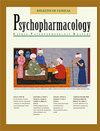Is There a Role of Gender in Electroconvulsive Therapy Response
Q Medicine
Klinik Psikofarmakoloji Bulteni-bulletin of Clinical Psychopharmacology
Pub Date : 2015-09-01
DOI:10.5455/BCP.20150207075355
引用次数: 9
Abstract
ABS TRACT: Is there a role of gender in electroconvulsive therapy response? Objective: Gender difference is a significant determinant of treatment response. As in pharmacological agents, knowledge about this difference is also important for electroconvulsive therapy as an effective treatment modality. The current study aimed to examine the gender differences in terms of indications for electroconvulsive therapy, responses to treatment, and side effects that occur during its application. Methods: The hospital records of 176 adult patients (39 females and 137 males) having undergone bilateral temporal electroconvulsive therapy under anesthesia between 2007 and 2012 were examined retrospectively. Results: The mean age of women was higher than that of men, and the duration of hospitalization was longer in men. There was a significant difference between the genders in terms of the indications of electroconvulsive therapy. Major depression as a diagnosis and suicidal thoughts as an indication were more common in women, while catatonia was more common in men. The most frequent side effects were cardiovascular side effects and allergic reactions. No significant difference was determined in the response rates of the patients to electroconvulsive therapy according to their diagnosis and genders. Conclusion: Our results once again demonstrated that electroconvulsive therapy is a highly effective treatment in both genders. Some gender differences exist in terms of indication and diagnosis, although there was no difference in terms of response to electroconvulsive therapy. There is a need for prospective studies to identify the reasons for these differences.性别在电休克治疗反应中有作用吗
ABS文摘:性别在电休克治疗反应中有作用吗?目的:性别差异是治疗反应的重要决定因素。与药物一样,了解这种差异对于电休克治疗作为一种有效的治疗方式也很重要。目前的研究旨在检查在电休克治疗的适应症、治疗反应和治疗过程中发生的副作用方面的性别差异。方法:回顾性分析2007 ~ 2012年接受麻醉下双侧颞叶电休克治疗的176例成人患者(女39例,男137例)的临床资料。结果:女性的平均年龄高于男性,男性的住院时间更长。在电休克治疗的适应症方面,男女之间存在显著差异。重度抑郁症的诊断和自杀念头在女性中更为常见,而紧张症在男性中更为常见。最常见的副作用是心血管副作用和过敏反应。根据诊断和性别,患者对电休克治疗的反应率无显著差异。结论:我们的研究结果再次证明了电休克疗法对男女患者都是非常有效的治疗方法。尽管对电休克治疗的反应没有差异,但在适应证和诊断方面存在一些性别差异。有必要进行前瞻性研究,以确定这些差异的原因。
本文章由计算机程序翻译,如有差异,请以英文原文为准。
求助全文
约1分钟内获得全文
求助全文
来源期刊
CiteScore
0.34
自引率
0.00%
发文量
0
审稿时长
6-12 weeks

 求助内容:
求助内容: 应助结果提醒方式:
应助结果提醒方式:


